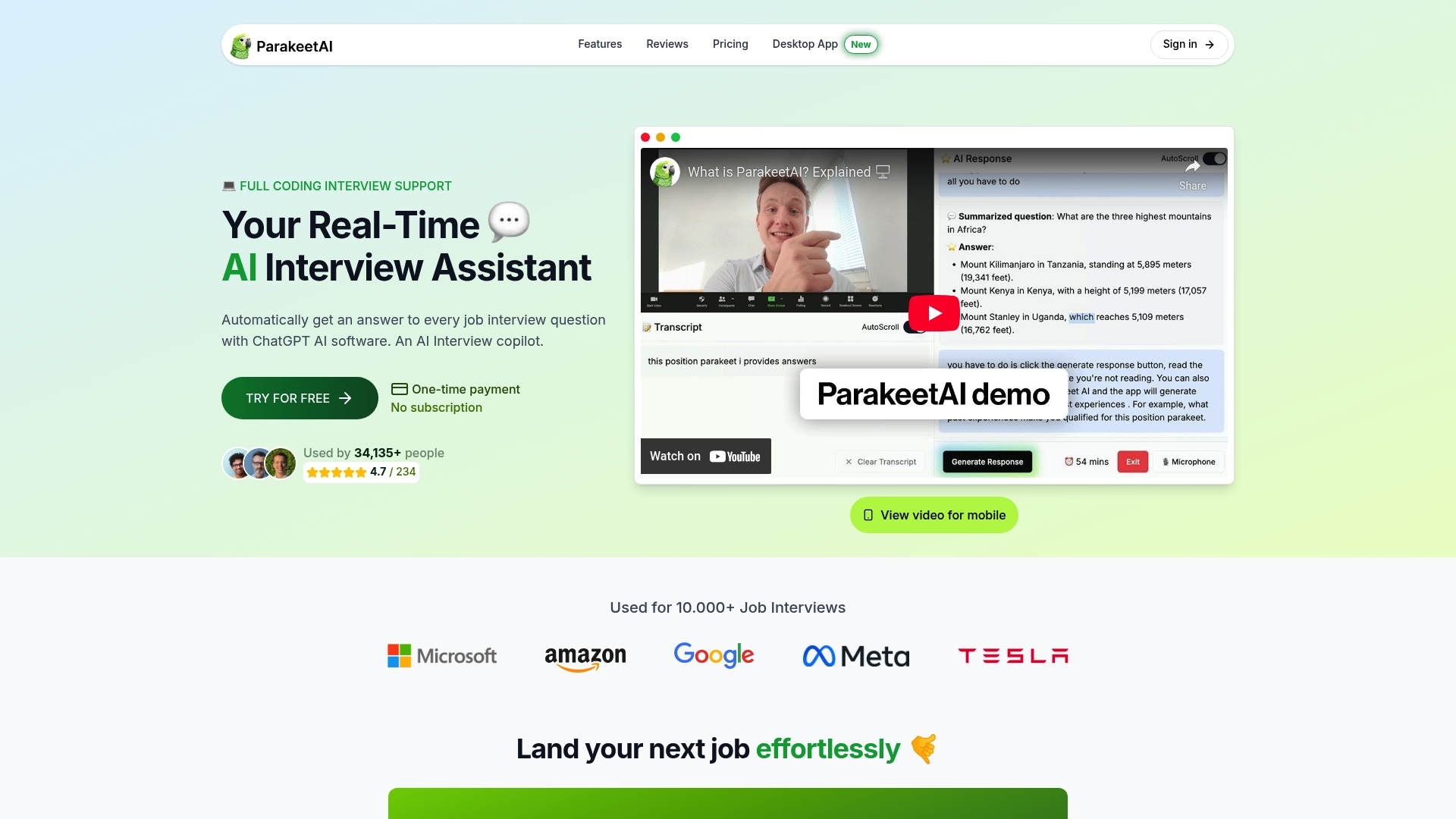7 Essential Mock Interview Questions and How to Answer Them

Over 80 percent of american job seekers feel anxious before interviews, yet few realize how much mock interview questions can change the game. These practice sessions provide a safe way to build confidence and sharpen your communication skills before facing real employers. Whether you are new to the workforce or aiming for a promotion, learning to tackle common interview questions through structured practice can make a powerful difference in your professional journey.
Table of Contents
- What Are Mock Interview Questions And Why Practice Them?
- How To Answer “Tell Me About Yourself” Effectively
- Top Tips For Handling “What Are Your Strengths?”
- How To Approach “Describe A Challenge You Faced”
- Mastering “Why Do You Want This Job?” Responses
- Best Ways To Tackle Technical And Scenario-Based Questions
- Final Tips For Improving Through Mock Interview Feedback
Overview
| Insight | Explanation |
|---|---|
| 1. Mock interviews build confidence. | Practicing in a simulated environment helps applicants reduce anxiety and communicate more effectively during real interviews. |
| 2. Structure your response to common questions. | Organizing answers, like using the Present-Past-Future model, showcases relevant skills to prospective employers. |
| 3. Use the STAR method for behavioral questions. | Employing the STAR method helps candidates clearly outline challenges faced and solutions, demonstrating their problem-solving skills. |
| 4. Research the company before interviews. | Understanding a company’s values and projects allows you to create tailored responses that highlight genuine interest and alignment. |
| 5. Feedback is essential for improvement. | Receiving constructive criticism from mock interviews helps identify weaknesses and refine approaches for future performance. |
1. What Are Mock Interview Questions and Why Practice Them?
Mock interview questions are simulated practice scenarios designed to help job seekers prepare for actual job interviews. These carefully crafted questions mimic real world interview environments and allow candidates to rehearse their responses, build confidence, and refine communication skills before meeting potential employers.
Practicing mock interviews provides numerous strategic advantages for job seekers. According to Orau.gov, mock interviews help candidates develop critical skills and reduce interview anxiety by creating a realistic practice environment. Professionals who engage in mock interviews can expect significant improvements in their overall interview performance.
Key Benefits of Mock Interview Practice:
- Identify and improve communication weaknesses
- Build confidence through repeated exposure
- Receive constructive feedback on verbal and nonverbal communication
- Develop strategies for answering challenging questions
- Reduce performance anxiety
By simulating real interview scenarios, job seekers can gain valuable insights into their presentation style, body language, and response strategies. As Coursera explains, mock interviews allow individuals to practice not just verbal responses but also critically examine aspects like professional attire, mannerisms, and overall demeanor.
The goal of mock interviews is not perfection but continuous improvement. Each practice session provides an opportunity to refine your approach, learn from mistakes, and develop a more polished professional presentation. Think of mock interviews as a rehearsal that transforms potential nervousness into confident preparation.
2. How to Answer “Tell Me About Yourself” Effectively
“Tell me about yourself” is often the first question in an interview and sets the tone for your entire conversation. This open ended prompt requires a strategic approach that transforms a potentially awkward moment into an opportunity to showcase your professional narrative.
According to University of Arizona Career Services, the key to answering this question effectively is structuring your response to highlight relevant experiences and skills that directly align with the job you are seeking. Your goal is to create a concise professional story that demonstrates why you are the ideal candidate.
Recommended Response Structure:
- Present: Describe your current professional role
- Past: Highlight relevant previous experiences
- Future: Explain why you are interested in this specific position
As University of Pennsylvania Career Services explains, a powerful response should summarize your professional background and key achievements while connecting them meaningfully to the position.
Practical tip: Aim for a 1 to 2 minute response that feels conversational but professionally polished. Practice your narrative to sound natural and confident, avoiding memorized scripts that might sound robotic. Your objective is to provide a compelling snapshot of your professional journey that sparks the interviewer’s interest and sets a positive tone for the rest of the interview.
For additional help preparing your professional narrative, check out our interview questions and answers guide which offers detailed strategies for crafting compelling responses.
3. Top Tips for Handling “What Are Your Strengths?”
“What are your strengths?” is a classic interview question designed to assess your self awareness and professional capabilities. This seemingly simple question requires a strategic approach that goes beyond listing generic attributes.
According to University of Pennsylvania Career Services, the key to effectively discussing your strengths is to choose attributes directly relevant to the job and provide specific examples that illustrate these strengths.
Strategic Approach to Highlighting Strengths:
- Select 3 to 4 core professional strengths
- Align strengths with job requirements
- Prepare concrete examples demonstrating each strength
- Connect strengths to potential value for the employer
Columbia Career Education emphasizes that effectively addressing this question involves identifying key skills that match job requirements and supporting them with tangible experiences.
Practical tip: Avoid generic statements like “I am a hard worker.” Instead, provide specific instances that prove your capabilities. For example, instead of saying “I am detail oriented,” you might share how your meticulous approach helped reduce errors in a previous project by 25 percent.
For comprehensive strategies on navigating interview questions, check out our interview questions and answers guide which offers detailed insights into crafting compelling responses.
4. How to Approach “Describe a Challenge You Faced”
The behavioral interview question “Describe a challenge you faced” is a strategic opportunity to showcase your problem solving skills and professional resilience. Interviewers use this question to understand how you navigate complex situations and demonstrate your ability to overcome workplace obstacles.
According to Coursera, the most effective approach is utilizing the STAR method: Situation, Task, Action, Result. This structured framework helps candidates clearly articulate their experiences and highlight their capabilities.
STAR Method Breakdown:
- Situation: Briefly describe the context
- Task: Explain your specific responsibility
- Action: Detail the steps you took
- Result: Share the positive outcome
CUNY Career Plan emphasizes that practicing responses to behavioral questions through mock interviews allows candidates to refine their storytelling techniques and effectively communicate problem solving skills.
Practical tip: Choose a challenge that demonstrates professional growth, not a trivial problem. Select an example where you played an active role in resolving the issue and learned something valuable. Avoid blaming others or presenting a challenge where you were completely passive.
For additional strategies on mastering interview questions, explore our comprehensive interview guide which provides in depth insights into crafting compelling responses.
5. Mastering “Why Do You Want This Job?” Responses
The interview question “Why do you want this job?” is more than a simple inquiry. It is a critical opportunity to demonstrate your genuine interest, professional alignment, and strategic career thinking.
Coursera emphasizes that preparing for this question requires comprehensive research into the company, understanding its values and culture, and articulating how your unique skills and career goals synchronize with the organization’s mission.
Key Components of an Outstanding Response:
- Show deep knowledge of the company
- Connect your career goals to the role
- Highlight specific aspects of the job that excite you
- Demonstrate how you can add value
- Avoid generic or superficial answers
CUNY Career Plan suggests that mock interviews provide an invaluable opportunity to practice articulating your motivation, helping you convey authentic interest and strategic alignment with the company’s objectives.
Practical tip: Your response should feel like a personalized narrative, not a rehearsed speech. Research the company thoroughly. Understand its recent projects, challenges, and strategic goals. Then craft a response that shows how your professional journey naturally intersects with the organization’s trajectory.
For more comprehensive strategies on crafting compelling interview responses, explore our common interview questions guide which offers detailed insights into interview preparation.
6. Best Ways to Tackle Technical and Scenario-Based Questions
Technical and scenario-based interview questions are designed to assess your problem solving skills, critical thinking, and ability to apply knowledge in real world situations. These questions go beyond simple factual recall and challenge you to demonstrate practical expertise.
Coursera highlights that engaging in mock interviews allows candidates to practice these challenging questions, receive constructive feedback, and improve their ability to articulate complex ideas clearly.
Key Strategies for Handling Technical Questions:
- Break down complex problems into smaller components
- Think out loud and explain your reasoning
- Ask clarifying questions if something is unclear
- Demonstrate your problem solving approach
- Stay calm and structured in your response
CUNY Career Plan emphasizes that mock interviews simulate real interview conditions, enabling candidates to refine problem solving approaches and communication skills.
Practical tip: When facing a technical or scenario based question, start by actively listening and confirming your understanding. Then structure your response systematically. Begin with the overall approach, walk through your thought process step by step, and conclude by summarizing your solution.
For more detailed strategies on mastering technical interview challenges, explore our technical interview tips guide which provides comprehensive insights into navigating complex interview questions.
7. Final Tips for Improving Through Mock Interview Feedback
Mock interview feedback is a powerful tool for professional growth, offering insights that transform potential weaknesses into strategic strengths. Understanding how to effectively leverage this feedback can significantly elevate your interview performance and career prospects.
According to Orau.gov, receiving personalized feedback helps candidates identify areas for improvement and refine their interview responses with precision.
Key Approaches to Processing Mock Interview Feedback:
- Listen openly without becoming defensive
- Ask specific questions about improvement areas
- Request concrete examples of your strengths and weaknesses
- Create an actionable improvement plan
- Practice implementing suggested changes
CUNY Career Plan emphasizes that constructive feedback allows candidates to recognize and address communication weaknesses while simultaneously building interview confidence.
Practical tip: Treat feedback as a developmental opportunity, not a critique. Record your mock interviews when possible, allowing you to review feedback alongside your actual performance. This visual approach helps you internalize suggestions more effectively.
For comprehensive strategies on maximizing your mock interview experience, explore our guide on conducting successful mock interviews which provides detailed insights into professional interview preparation.
In this table, we summarize key concepts and strategies from the article on mock interview preparation and handling various interview questions.
| Topic | Description | Key Considerations |
|---|---|---|
| Mock Interview Questions | Simulated practice to prepare for real interviews, building confidence and communication skills. | Identify weaknesses, refine responses, reduce anxiety. |
| Answering “Tell Me About Yourself” | Structure response to emphasize relevant skills and experiences. | Present -> Past -> Future framework, aim for 1-2 minutes. |
| Discussing Strengths | Select relevant strengths and illustrate with examples. | Relate to job requirements, provide concrete instances. |
| Describing Challenges | Use the STAR method to articulate problem-solving experiences. | Focus on personal growth and active roles in solutions. |
| “Why Do You Want This Job?” | Demonstrate genuine interest and alignment with company goals. | Research company values, personalize narrative, avoid generic responses. |
| Technical Questions | Showcase problem-solving and critical thinking skills. | Break down problems, explain reasoning, clarify questions. |
| Mock Interview Feedback | Use feedback for professional growth to identify and improve weaknesses. | Open listening, actionable plans, review recordings. |
Boost Your Interview Confidence with AI-Powered Mock Practice
The article highlights just how crucial mock interviews are for mastering tough questions like “Tell me about yourself” and “Why do you want this job.” Many candidates struggle with anxiety and uncertainty when facing these challenges. They want to improve their communication, receive clear feedback, and practice responses that feel natural and compelling. That is exactly where the power of AI can make a difference.

Experience a real-time AI job interview assistant designed to listen, understand, and provide you with instant answers tailored to common and complex interview questions. Start transforming nervousness into confidence by practicing your strengths, refining your STAR method storytelling, and mastering technical scenarios all in one place. Don’t wait to improve—visit Parakeet AI and explore how our interview questions and answers guide can complement your AI-powered preparation for every step of your job search.
Frequently Asked Questions
What are the benefits of practicing mock interview questions?
Practicing mock interview questions helps job seekers identify communication weaknesses and build confidence through repeated exposure. To maximize the benefits, schedule at least three mock interviews before your actual interview to refine your approach and improve your responses.
How should I structure my answer to ‘Tell me about yourself’?
To answer ‘Tell me about yourself’ effectively, structure your response by discussing your present role, past experiences, and future career goals. Aim for a 1 to 2 minute narrative that highlights relevant skills and aligns with the job you’re applying for.
What is the best way to discuss my strengths in an interview?
Identify 3 to 4 strengths that are directly relevant to the position and provide specific examples that demonstrate those strengths. Prepare to explain how these strengths can add value to the employer, making your response clear and actionable.
How can I effectively use the STAR method for behavioral questions?
To use the STAR method for behavioral questions, structure your answer by outlining the Situation, Task, Action, and Result. Practice this approach with at least two different challenges you’ve faced to ensure you can articulate your problem-solving skills clearly and effectively.
What should I research to answer ‘Why do you want this job?’
Research the company’s values, recent projects, and challenges to craft a personalized response that connects your career goals with the role. This preparation will help you deliver a thoughtful answer that demonstrates your genuine interest in the position.
How can I use feedback from mock interviews to improve?
Receive feedback openly and create an actionable improvement plan based on the specific areas highlighted. Implement these changes in your next practice session to continuously refine your responses and boost your interview performance.




